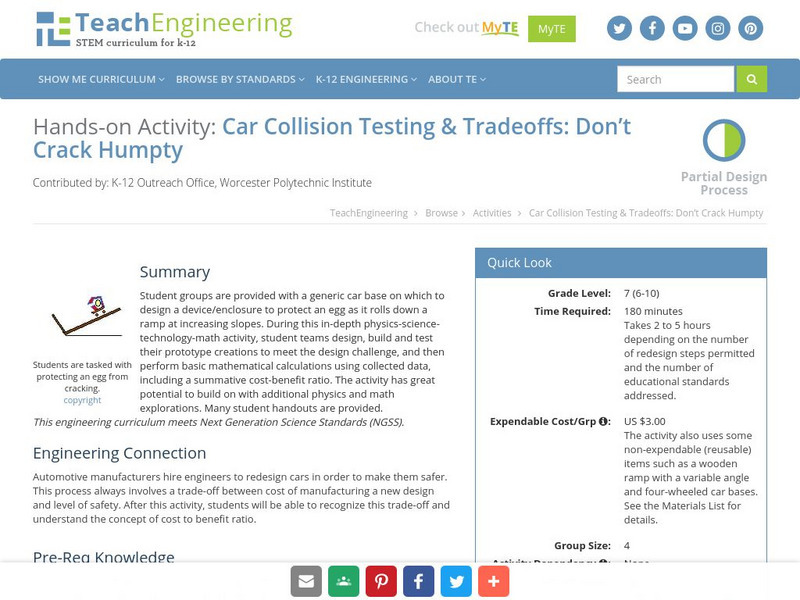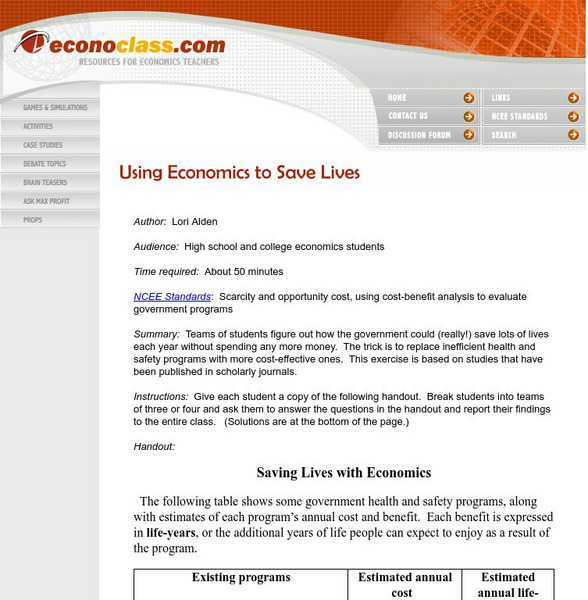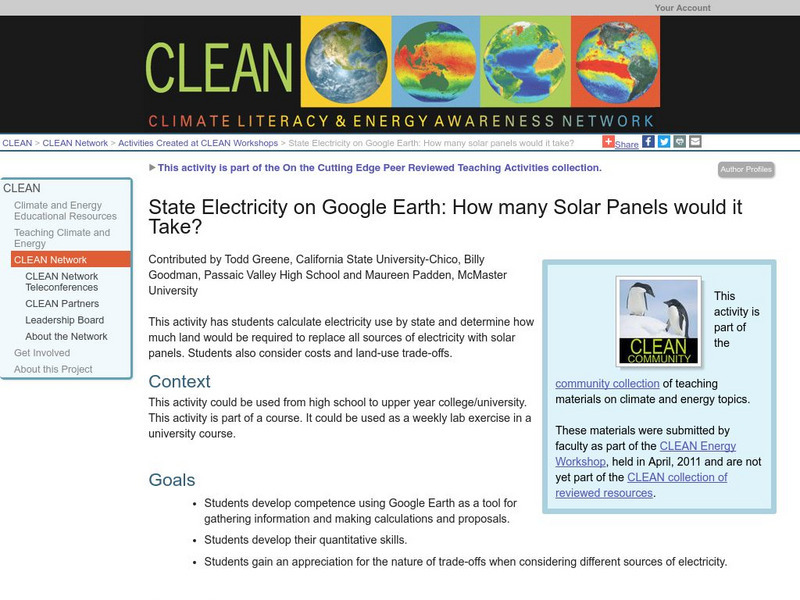Hi, what do you want to do?
Social Science Education Consortium
Ssec: Health Care: Who Should Pay the Cost? [Pdf]
In this investigation, students explore issues around the provision of health care in the United States. They look at how it is financed, why the costs are growing so rapidly, whether it is a public or private good, and possible...
Council for Economic Education
Econ Ed Link: Country Mouse Makes a Decision! (Student Version)
Use this site to teach your primary students how to identify the costs and benefits of making a decision. Animated link to the story, Country Mouse Makes a Decision, makes this an entertaining and educational economics lesson.
TeachEngineering
Teach Engineering: Car Collision Testing & Tradeoffs: Don't Crack Humpty
Student groups are provided with a generic car base on which to design a device/enclosure to protect an egg as it rolls down a ramp at increasing slopes. During this activity, student teams design, build and test their prototype...
Council for Economic Education
Econ Ed Link: The 411 on College Education
What are the costs and benefits to getting a college degree? Use this lesson plan to get your learners thinking about the options they have for higher education and how to pay for it.
National Geographic
National Geographic: Evaluating Other Energy Sources
A comprehensive lesson where students examine the different costs and benefits associated with renewable and nonrenewable sources of electricity. Includes a 22-question interactive module where they look at real-world data and images...
Council for Economic Education
Econ Ed Link: Off to Interactive Island
This activity provides a fun way to explore concept of economic decision making. In the lesson, students are given a limited number of "tokens" and asked to exchange those tokens for goods in preparation for pioneering in a new land....
Council for Economic Education
Econ Ed Link: The Economics of Voting: What Do You Mean My Vote Doesn't Count?
This lesson explores the costs and benefits associated with voting in national elections. Specifically, the concepts of rational apathy, rational ignorance and expressive voting are explained.
Council for Economic Education
Econ Ed Link: If You Hear a Hoot, Then This Site Is Kaput
Should the Endangered Species Act of 1973 be left alone so the legal system is left to decide the toughest cases? Should the Endangered Species Act of 1973 be revised in order to increase economic growth without endangering listed...
Council for Economic Education
Econ Ed Link: The Economics of Homebuying
This lesson analyzes the costs and benefits of homeownership and asks the student to describe the factors that affect affordability, use cost-benefit analysis and knowledge of home-buying procedures to reduce the costs, analyze the...
Council for Economic Education
Econ Ed Link: An Investigation of Regional Housing Costs
This lesson plan has students explore differences in regional housing costs, determine the percentage of gross income spent on housing, assess the impact of housing costs on a relocation decision and recognize wages and housing costs are...
Scholastic
Scholastic: Shake, Rattle & Roll
Middle schoolers will learn and reinforce skills for creating and analyzing scatterplots and histograms; using cost-benefit analysis to make predictions from data and using tree diagrams to understand outcomes of events.
Council for Economic Education
Econ Ed Link: You're Going to College
The young scholars will explore the costs and the benefits of going to college. They participate in a three-part game designed to help them understand the decisions associated with attending college and the benefits available to college...
Council for Economic Education
Econ Ed Link: Tapped Dry: How Do You Solve a Water Shortage?
Economists do not operate in a vacuum. If an economist is going to suggest that the price of a good needs to be increased, he or she needs to consider who will bear the increase in costs. Will the costs be distributed equally or will one...
Council for Economic Education
Econ Ed Link: Incentives Video and Quiz
Economics website with video [1:35] and interactive quiz teaches about costs, benefits, and incentives.
Other
Icpdr: Ships and Environment to Share Danube River
This is a comprehensive analysis of the importance of the Danube River Basin and ways to balance human and ecological needs in the basin. The reason behind this study is the European Union's move to open shipping lanes in the Danube and...
Econoclass
Econoclass: Using Economics to Save Lives
This activity presents students with the challenge of saving lives through public policy. A cost-benefit analysis of current programs and potential policies will be used.
Climate Literacy
Clean: State Electricity on Google Earth: How Many Solar Panels Would It Take?
This activity addresses the Energy Awareness Principle by having students calculate electricity use by state, and also determine how much land would be required to replace all sources of electricity with solar panels considering costs...
Council for Economic Education
Econ Ed Link: The Mystery of the Voters Who Don't Vote
This lesson plan from the Council for Economic Education for students, grades 9-12, examines the question of why many Americans don't vote. It interestingly ties the answer to some economic terms such as choice, cost/benefit analysis,...
US Environmental Protection Agency
Epa: Learn About Green Infrastructure
The EPA provides many ideas for integrating green infrastructures into communities. This site also discusses how this can build climate resilience and offers resources for doing a cost-benefit analysis, for addressing government...
Council for Economic Education
Econ Ed Link: Dumptown, Usa: Making a Ton of Difference
The amount of trash produced in the United States is mounting with each passing year. Communities are finding it increasingly difficult and costly to handle trash disposal. Recycling is considered a key solution to the garbage problem....
Council for Economic Education
Econ Ed Link: The Economics of Voting
Since the 1960s, many Americans eligible to vote have not bothered to do so- not even in presidential elections. Low rates of participation in voting have been worrisome to people interested in preserving our democratic traditions....
Council for Economic Education
Econ Ed Link: Worker Safety the Triangle Fire Legacy
Students investigate the Triangle Shirtwaist Fire tragedy and how its impact is still felt today. Students identify eerie parallels between the Triangle Fire and more recent workplace events with safety implications. How can future...
Council for Economic Education
Econ Ed Link: Mobile Phones Matter
A lesson exploring whether or not mobile phones matter when it comes to financial management and financial decision-making.
Council for Economic Education
Econ Ed Link: What Happened to Railroads?
Between the Civil War and World War II, railroads were one of the nation's most important businesses and an integral part of people's lives. In this lesson, learners assume the role of detectives investigating why the rail companies...





![Ssec: Health Care: Who Should Pay the Cost? [Pdf] Lesson Plan Ssec: Health Care: Who Should Pay the Cost? [Pdf] Lesson Plan](https://static.lp.lexp.cloud/images/attachment_defaults/resource/large/FPO-knovation.png)









